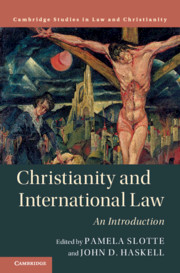Book contents
- Christianity and International Law
- Law and Christianity
- Christianity and International Law
- Copyright page
- Dedication
- Contents
- Tables
- Contributors
- Acknowledgments
- 1 Christianity and International Law: An Introduction
- 2 The Byzantine Commonwealth and the Emerging Features of a Law of Nations in the First Millennium
- 3 Christianity and the Birth of Ambassadorial Deontology: Some Historical Notes
- 4 Formation and Refiguration of the Canon Law on Trade with Infidels (c.1200–c.1600)
- 5 God, Sovereignty, and the Morality of Intervention outside Europe
- 6 The Significance of Christian Charity to International Law
- 7 Hugo Grotius: On Freedom of the Seas and Human Nature
- 8 Ius gentium et naturae: The Human Conscience and Early Modern International Law
- 9 Legalizing Antisemitism? The Legacy of Savigny’s Roman(tic) Law
- 10 Missionary Knowledge and the Empirical Foundations of Modern International Legal Thought
- 11 Standards for a Righteous and Civilized World: Religion and America’s Emergence as a Global Power
- 12 International Protestantism and Its Changing Religious Freedoms
- 13 Beyond the Freedom of Worship: The Contested Meaning of Religious Freedom in International Human Rights Law and Politics, 1945–1967
- 14 Process Theology and a Pluralistic Foundation for Human Rights
- 15 Christianity and Human Rights Law: Orthodox Perspectives
- 16 Conquest, Sacred Sites, and “Religion” in a Time of Crisis
- 17 Constantine’s Legacy: Preserving Empire While Undermining International Law
- 18 Hopelessly Practicing Law: Asylum Seekers, Advocates, and Hostile Jurisdictions
- 19 The Hidden Theology of International Legal Positivism
- Select Bibliography
- Index
- References
12 - International Protestantism and Its Changing Religious Freedoms
Published online by Cambridge University Press: 17 May 2021
- Christianity and International Law
- Law and Christianity
- Christianity and International Law
- Copyright page
- Dedication
- Contents
- Tables
- Contributors
- Acknowledgments
- 1 Christianity and International Law: An Introduction
- 2 The Byzantine Commonwealth and the Emerging Features of a Law of Nations in the First Millennium
- 3 Christianity and the Birth of Ambassadorial Deontology: Some Historical Notes
- 4 Formation and Refiguration of the Canon Law on Trade with Infidels (c.1200–c.1600)
- 5 God, Sovereignty, and the Morality of Intervention outside Europe
- 6 The Significance of Christian Charity to International Law
- 7 Hugo Grotius: On Freedom of the Seas and Human Nature
- 8 Ius gentium et naturae: The Human Conscience and Early Modern International Law
- 9 Legalizing Antisemitism? The Legacy of Savigny’s Roman(tic) Law
- 10 Missionary Knowledge and the Empirical Foundations of Modern International Legal Thought
- 11 Standards for a Righteous and Civilized World: Religion and America’s Emergence as a Global Power
- 12 International Protestantism and Its Changing Religious Freedoms
- 13 Beyond the Freedom of Worship: The Contested Meaning of Religious Freedom in International Human Rights Law and Politics, 1945–1967
- 14 Process Theology and a Pluralistic Foundation for Human Rights
- 15 Christianity and Human Rights Law: Orthodox Perspectives
- 16 Conquest, Sacred Sites, and “Religion” in a Time of Crisis
- 17 Constantine’s Legacy: Preserving Empire While Undermining International Law
- 18 Hopelessly Practicing Law: Asylum Seekers, Advocates, and Hostile Jurisdictions
- 19 The Hidden Theology of International Legal Positivism
- Select Bibliography
- Index
- References
Summary
The enshrining of religious freedom in international law has long been a Protestant project. Whether as theoreticians, advocates, or policymakers, Protestants played a significant role in securing the right for religious worship’s inclusion in major international treaties and conventions, and in explaining why it could trump national sovereignty. This was true in the era of “high imperialism” and brutal European expansion, most notably in the 1885 Berlin Final Act, which divided Africa between the leading colonial powers. Representatives of Protestant missions from Britain and Germany and Protestant scholars of international law were important in drafting a clause that guaranteed “freedom of consciousness and religious toleration” to both Africans and Europeans, and which allowed missionaries of all denominations to freely preach without state restriction. Protestant visions were also central to the establishment of the League of Nations’
Keywords
- Type
- Chapter
- Information
- Christianity and International LawAn Introduction, pp. 246 - 262Publisher: Cambridge University PressPrint publication year: 2021

